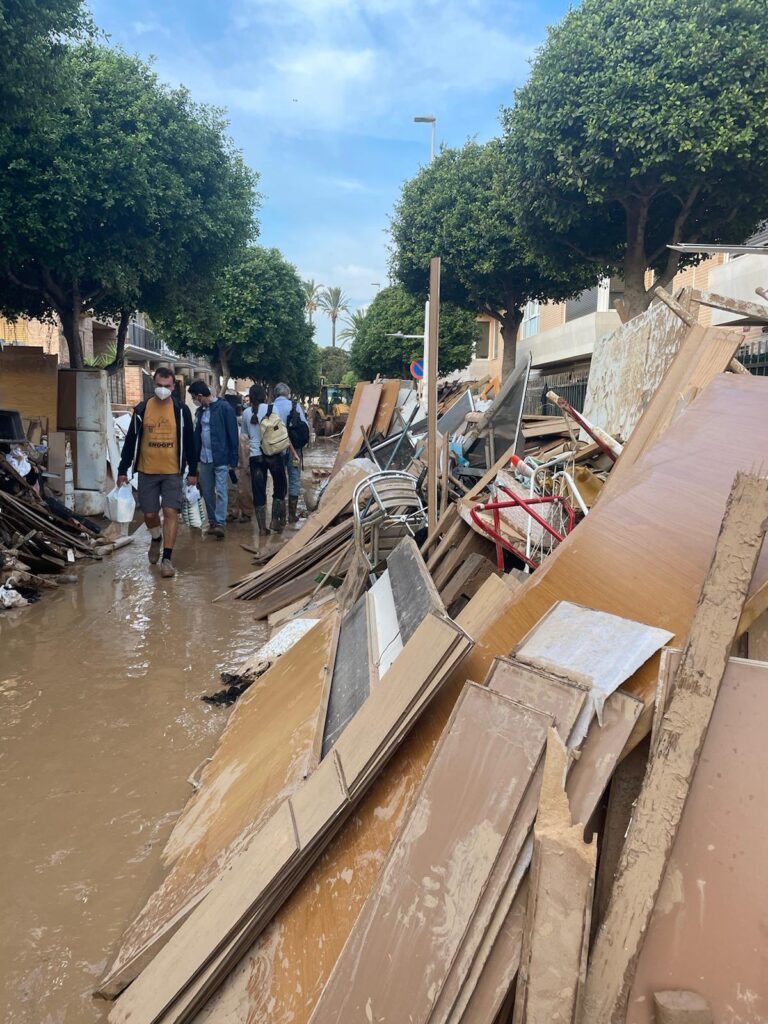Probable cases of leptospirosis have been detected in volunteers in the clean-up operation around Valencia. Catherine Dolan reports…
Two probable cases of the bacterial infection leptospirosis have been detected, the Valencia health department confirmed today. Leptospirosis is a normally mild infection with flu-like symptoms, but if left untreated can be fatal.
The two infected people had both been volunteering in the areas affected by last week’s catastrophic flooding in Valencia. The DANA event has so far claimed the lives of 211 people. Officials said they were progressing well, although one of the patients is in hospital under observation.
Leptospirosis is a bacterial illness which is generally caught through contact with flood waters, damp soil and sludge contaminated with the urine or tissue of infected animals, with rats being the most frequent source. These bacteria can enter the body through skin or mucosal lesions, affecting both people living in the affected areas and those involved in clean-up and rescue work.
The majority of cases are self-limiting. They present mild flu-like symptoms such as a temperature, general malaise and aching muscles. They can normally be treated with a simple course of antibiotics. However, for those with a weakened immune system, the illness can become more severe. In extreme cases it can prove fatal.
Local doctor, Lucia Cubells, stressed the need for people to follow the health department’s guidelines. She urges people to protect themselves when helping with the clean-up.
She also said it was really important to keep an eye out for any possible symptoms. “If you have a high temperature, muscular pain or a headache you should go and see a doctor as soon as possible. It’s also important to tell the doctor that you’ve been to one of the affected areas.”
“If leptospirosis goes on for a long time without treatment it could lead to more serious complications. But if it’s treated from the beginning, it should be OK. That’s why it’s so important to seek medical attention early on. “

Symptoms to watch out for
The health department says to keep a close eye on symptoms of people exposed to flooded areas or who have participated in clean-up work in the affected municipalities. They should go to the health centre if necessary.
Symptoms to watch out for include a persistent high temperature, severe diarrhoea or vomiting, severe abdominal pain or yellowing of the skin and/or eyes.
In addition, dark urine, persistent cough or shortness of breath, red or purple rashes on the skin that may indicate bleeding under the skin, severe headache or stiff neck, confusion, disorientation or agitation may also be observed.
Special attention should also be paid to open wounds, especially if they show signs of infection (redness, swelling, discharge or pain).
Recommendations
The health department advises anyone planning to volunteer to wash hands thoroughly with soap and water, use a facemask, gloves, rubber boots, eye protection and appropriate long-sleeved clothing when cleaning the affected areas, as well as not eating food in contact with the flooded ground.
In addition, when cleaning houses, officials recommend opening windows and doors to ventilate, remove all wet belongings, stagnant water, mud and sludge, clean walls and floors and disinfect with bleach.
If animal carcasses are found, they should be handled as little as possible, using the correct protective equipment. Avoid contact with bodily fluids and follow the local council’s instructions for disposal. Finally, to avoid respiratory problems, it is recommended to use portable generators or engines outside homes and garages, taking care to keep them away from doors, windows or grilles of homes.